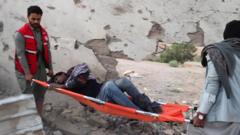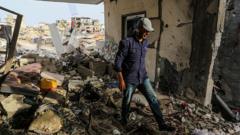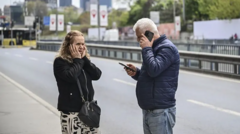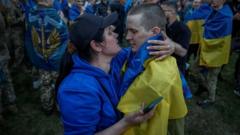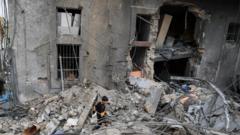The picturesque village of Sergele in Iraqi Kurdistan now stands on the frontline of Turkey's conflict with the PKK, as Turkish military bases encroach upon local lands. Villagers are facing displacement and danger due to increasing military activity, which some accuse of being an occupation, while the Iraqi government remains restrained amid foreign policy complexities.
Life Amidst Conflict: The Struggles of Villagers in Iraq's Forbidden Zone
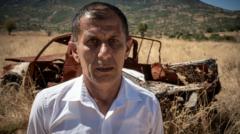
Life Amidst Conflict: The Struggles of Villagers in Iraq's Forbidden Zone
Residents of Sergele in Iraqi Kurdistan find their livelihood threatened as Turkey's military presence intensifies in the region amid ongoing conflict with the PKK.
Nestled deep in the mountains of Iraqi Kurdistan, the serene village of Sergele has traditionally thrived on agriculture, growing pomegranates, almonds, and peaches while gathering wild fruits and spices from the nearby forests. However, this charming settlement, located just 16 kilometers (10 miles) from the Turkish border, is increasingly overshadowed by Turkish military bases that have sprung up on the surrounding ridges.
Farmer Sherwan Sergeli, 50, laments the loss of access to his land, asserting that "this is 100% a form of occupation of Kurdish [Iraqi Kurdistan] lands." Over the past two years, Turkish forces have built at least seven bases near Sergele, including one by a dam that controls essential water resources for the village. This situation has thrust Sergele into the heart of the "Forbidden Zone" delineated by the ongoing conflict between Turkey and the Kurdish militant group PKK, an insurgent faction opposing the Turkish state since 1984.
The Human Rights Group, Community Peacemaker Teams, indicates that the escalation of military actions in the Forbidden Zone has had a dire human cost, resulting in numerous civilian casualties from drone and air strikes. Reports from 2020 cited thousands displaced from their land, with entire villages emptied. Turkish air operations have intensified in the vicinity of Sergele, as the military seeks to eliminate PKK militants who operate from hidden caves across the region.
This military expansion is not isolated; satellite imagery and reports illustrate that Turkey has recently erected at least 136 military installations throughout northern Iraq and constructed lengthy supply routes into the mountains, causing notable ecological damage. The majority of these installations have come about since 2018, correlating with Turkey’s enhanced military capabilities and strategic endeavors in the region. The Turkish government has justified its presence as a necessary measure against the PKK, which it categorizes as a terrorist entity.
The plight of Sergele resonates with similar narratives found in nearby areas like Kani Masi, where a once-thriving apple production community has dwindled due to the heavy military presence—villagers now avoiding their fields due to the imminent threat from drones. Local farmers express fears that the Turkish military aims to assert control over these territories permanently.
The dynamics of this conflict are further complicated by the response from Iraq’s central government and the semi-autonomous Kurdistan Regional Government (KRG). Publicly, Iraq has denounced Turkey's military actions, yet diplomatically, it has been forced to accommodate Turkish demands, signing agreements for joint operations against the PKK without restricting Turkey's military footprint.
Authorities from the KRG, which has a vested interest in maintaining favorable ties with Turkey, tend to minimize civilian casualties resulting from Turkish operations, attributing them to PKK activity instead. A view endorsed by high-ranking KDP officials suggests the Turkish military does not interfere with the daily lives of locals.
Nevertheless, civilians remain in precarious situations, as illustrated by accounts of individuals like 24-year-old Alan Ismail, who tragically lost his life due to an air strike while on an outing. His death, compounded with a lack of accountability and justice, exemplifies the broader issue of civilian safety amidst ongoing conflict.
Ultimately, despite formal acknowledgments of civilian casualties by the KRG, the lasting scars of violence and displacement plague residents of Sergele and beyond, with many waiting for recognition and compensation for their suffering—highlighting an ongoing struggle for justice amid a complex tapestry of political interests and military actions.

